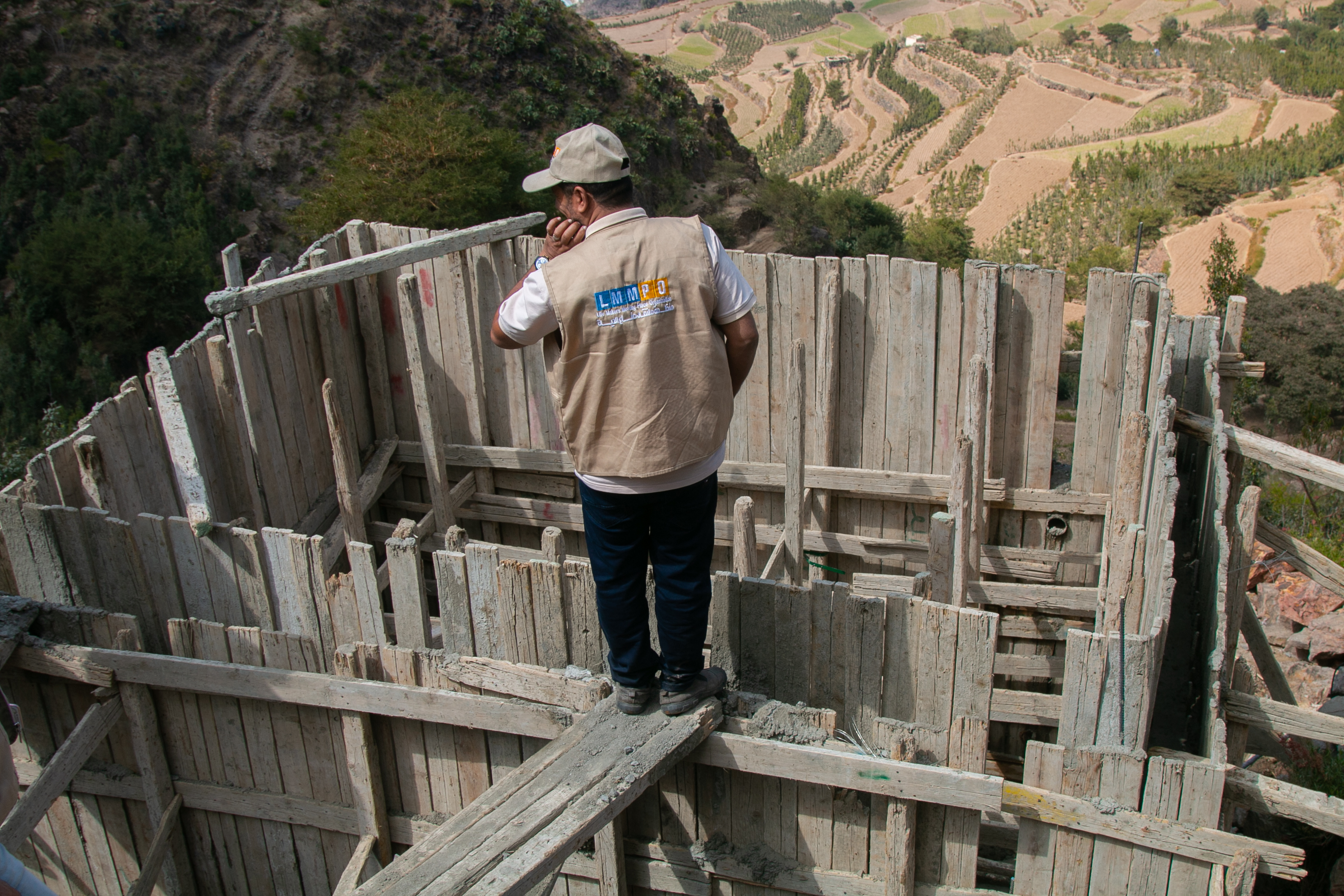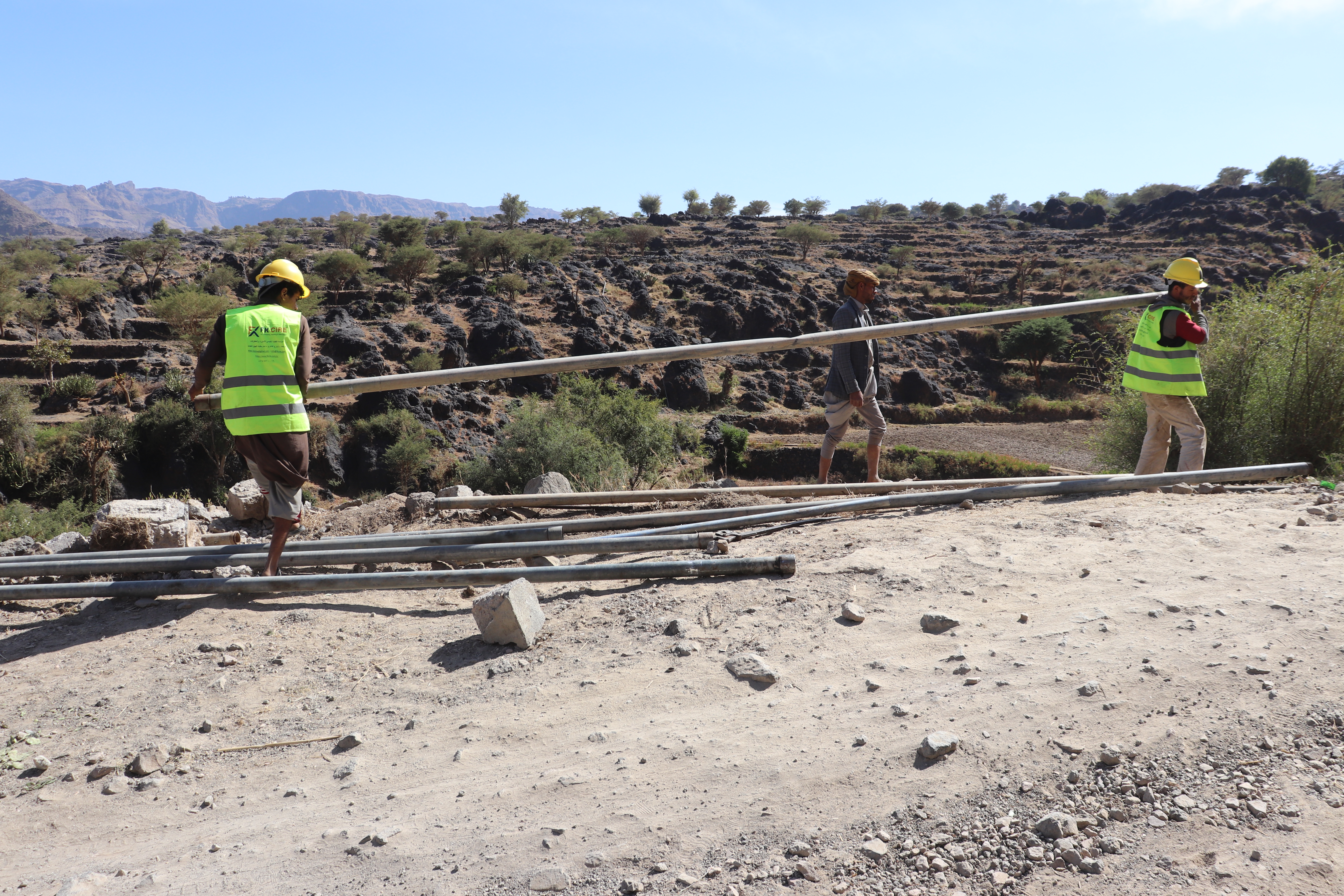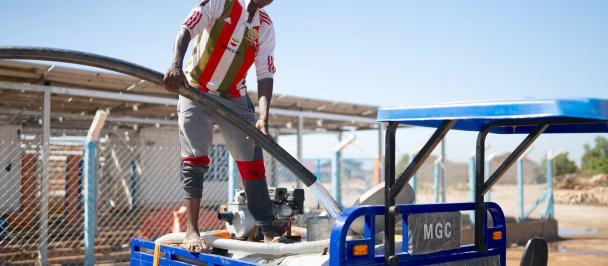From conflict to cooperation: Yemeni communities find common ground over water
March 24, 2024

Water for Peace in Yemen
Water, the elixir of life, can also be a flashpoint for tension. In Yemen, where water scarcity is a harsh reality, communities have experienced disputes over vital water resources, threatening livelihoods and stability. Overcoming these challenges requires dialogue and cooperation and can be a testament to the power of human resilience and the potential for communities to strengthen social cohesion in the face of adversity.
Implemented by the United Nations Development Programme (UNDP) with funding from the German Federal Ministry for Economic Cooperation and Development (BMZ) through the German Development Bank (KFW), the Enhancing Resilience through Sustainable Water Resource Management Project supports Yemeni communities in dealing with potential water-related challenges. This project, with its four main components – inclusive water management, peaceful dispute resolution, infrastructure restoration, and sustainable agriculture – is implemented in partnership with the United Nations Food and Agriculture Organization and aims to transform water resource management into an inclusive and participatory process that promotes social cohesion and stability.
Jabal Al-Sharq Overcomes Water Network Dispute
Deep in the heart of Dhamar Governorate, nestled amidst rolling hills and bathed in golden sunshine, lies the village of Al-Err. Its inhabitants, for generations, have relied on the water available in the Al-Qibli well. However, challenges arose when the neighboring villages of Beit Ja'afar and Bani Rashid asserted ownership of the water network, disrupting the flow to not only Al-Err but also Al-Jawjebi, Bani Nashwan, and the surrounding agricultural lands. This dispute jeopardized irrigation for agricultural land, domestic water needs, and ultimately, the very survival of these communities.
These communities teetered on the brink of discord over a resource that should have united them. However, empowered by training on conflict resolution, the Water Users Associations (WUAs) of Bani Gushaib and Al-Maghrabah played a pivotal role in facilitating dialogue and proposing a solution.
Their plan envisioned a separate water network for the Al-Err area, allowing the village of Al-Jawjebi to take control of their own water supply. This self-reliance would not come at the expense of others. New water pipes would be extended to the reservoir, ensuring that the water needs of all neighboring villages, for both irrigation and domestic use, were met.
To translate this vision into reality, a skilled engineer was appointed. The task was no small feat – a 359-meter lifeline, comprised of sturdy 3-inch diameter galvanized pipes, needed to be snaked from the well to a distribution point near Al-Mabrugah village. Two strategically located valve rooms, one at the well and another near Al-Mabrugah village, would ensure efficient water flow to the villages in need.

The impact of this initiative, one of 27 implemented across the governorates of Dhamar, Abyan, and Hadramout, was profound. It made a difference in the lives of approximately 4,000 individuals, of which many whose livelihoods depended on a thriving agricultural sector. With the resolution of the conflict and the establishment of a dedicated water network, these communities could not only regain stability but also embark on a journey towards sustainable water management, ensuring the continuous use of this precious resource.

As the project unfolded, the communities, guided by facilitation by local Water User Associations, embarked on a path of reconciliation. This was not just about water; it was about rebuilding trust, fostering collaboration, and envisioning a future where water was no longer a source of contention but a shared resource.
Al-Qurayat Farmers Find Common Ground
Further south, in the picturesque village of Al-Qurayat nestled within the Zanjibar district of Abyan, another water-related conflict simmered. For years, a border ran through the heart of the village, dividing farmers along the east and west banks of the Salem Nassib Water Gate and Ditch No. 2. This invisible barrier began in 2011, and with each passing rainy season, the tension escalated. Farmers on the western side, during periods of heavy rainfall, would partially or completely close the water gate, hindering the flow of water to their eastern counterparts. This act of desperation, fueled by a perceived scarcity, led to resentment, disputes, and even clashes.

Salem Nassib Water Gate and Ditch No. 2 in Al-Qurayat village before rehabilitation.
Recognizing the gravity of the situation, the local Agricultural and Irrigation Office, along with Al-Qurayat sheikhs and community leaders, embarked on a series of mediation meetings. Their aim was simple – to find common ground, a solution that addressed the concerns of both sides. However, despite their tireless efforts, these meetings only offered temporary reprieves. The underlying problem – the dilapidated state of Salem Nassib Water Gate and Ditch No. 2 – remained a constant reminder of their vulnerability.
To ensure a lasting resolution, the Al-Qurayat Water User Association proposed a comprehensive solution that addressed the closure of the water gate and deteriorated state of the canal. The rehabilitation plan involved thoroughly removing obstacles, sediment, and dirt mounds that had accumulated over time, hindering the flow and increasing the loss of water. Additionally, the entrance and exit of the canal would be thoroughly cleaned.
To enhance the functionality of the irrigation system in the long run, the community, with the support of a specialized engineer, planned to install a new main iron gate, measuring 2.7 meters in width. This gate would ensure better control over water flow, preventing future disputes caused by partial or complete gate closures. Lastly, to ensure the longevity of the canal, stone walls would be constructed on both sides, creating a level surface, and preventing erosion. This comprehensive approach aimed to preserve water during the rainy season, ensuring an abundant supply for all community members and the canal's continued functionality for years to come.

Salem Nassib Water Gate and Ditch No. 2 in Al-Qurayat village during and after rehabilitation.
By rehabilitating Salem Nassib Water Gate and Ditch No. 2, the community aimed to improve the water supply for farmers and 500 local residents. Through their collective efforts, the Water User Association members of Al-Qurayat demonstrated the power of unity and resilience.
"The intervention in Al-Qurayat has had a profoundly positive impact," says Anees Al-Shadadi, a member of the Al-Qurayat Water User Association. "Now, water is abundant for everyone, and we have successfully averted a potential conflict."
By promoting inclusive water management, peaceful dispute resolution, infrastructure restoration, and sustainable agriculture, the Enhancing Resilience through Sustainable Water Resource Management Project is transforming water resource management into a process that fosters social cohesion, stability, and a brighter future for Yemeni communities.
About the project
Funded by the German Development Bank (KFW) and implemented by the UNDP, the Enhancing Resilience through Sustainable Water Resource Management Project focuses on empowering national and local water institutions, such as the National Water Resources Authority and Water User Associations, to manage water resources effectively and transparently. This includes crucial infrastructure rehabilitation to ensure long-term water availability and the revival of traditional water harvesting mechanisms, promoting low-cost and sustainable water management practices. Additionally, training was provided to Water User Associations to equip them with the skills to effectively manage water resources and resolve disputes within their communities.
As a pilot project, the initiative also supported the production of alternative agricultural products, specifically shifting from qat (a water-intensive crop) to coffee, a more sustainable option. Furthermore, the project emphasizes the empowerment of women by building their leadership and technical skills, enabling their increased involvement in community-based organizations. This is crucial for enhancing the well-being of women and their households, ultimately contributing to local-level social cohesion and resilience.

 Locations
Locations


